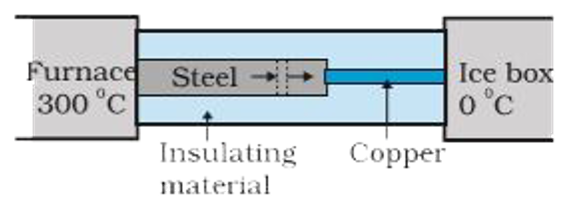Complete Solutions to Example of chapter THERMAL PROPERTIME OF MATTER of Class 11 book with complete answers and questions
| Class 11 | PHYSICS |
| Chapter | THERMAL PROPERTIME OF MATTER |
| NCERT TAMIL | Example |
| Number Of Questions | 8 |
| Academic Year | 2023-24 |
Show that the coefficient of area expansions `(Delta A//A)//Delta T` of a rectangular sheet of the solid is twice its linear expansivity `alpha`.
View SolutionA blacksmith fixes iron ring on the rim of the wooden wheel of a bullock cart. The diameter of the rim and the ring are `5.243 m` and `5.231 m` respectively at `27^(@)C`. To what temperature should the ring be heated so as to fit the rim of the wheel ? Coefficient of linear expansion of iron =` 1.20 xx 10^(-5) K^(-1)`
View SolutionA sphere of aluminium of 0.047 kg is placed for sufficient time in a vessel containing boiling water, so that the sphere is at `100^(@)` C. It is then immediately transferred to 0.14 kg copper calorimeter containing 0.25 kg of water at `20^(@)` C. The temperature of water rises and attains a steady state at `23^(@)`Calculate the specific heat capacity of aluminium. (Give specific heat of copper `=0.386xx10^(3)Jkg^(-1)K^(-1))`.
View SolutionWhen 0.15 kg of ice at `0^(@)C` is mixed with 0.30 kg of water at `50^(@)C` in a container, the resulting temperature is `6.7^(@)C`. Calculate the heat of fusion of ice. `(s_(water) = 4186 J kg^(-1)K^(-1))`
View SolutionCalculate the heat required to convert 3 kg of ice at `-12^(@)C` kept in a calorimeter to steam at `100^(@)C` at atmospheric pressure. Given,
specific heat capacity of ice = `2100 J kg^(-1) K^(-1)`
specific heat capicity of water = `4186 J kg^(-1)K^(-1)`
Latent heat of fusion of ice = ` 3.35 xx 10^(5) J kg^(-1)`
and latent heat of steam = ` 2.256 xx 10^(6) J kg^(-1)` .
View SolutionWhat is the temperature of the steel - copper junction in the steady state of the system shown in Fig.11.15.

Length of the steel rod ` = 15.0 `cm, length of the copper reod ` = 10.0` cm, temperarure of the furnace ` = 300 ^(@) C`, temperature of the furnace ` = 300 ^(@) C` , temperature of the other end ` = 0^(@) C`. The are of cross section of the steel rod is twice that of the copper rod. ( Thermal conductivity of steel ` = 50.2 J s^(-1) m^(-1) K^(-1) ,` and of copper ` = 385 J s^(-1) m^(-1) K^(-1))`.
View SolutionAn iron bar `(L_(1) = 0.1 m , A_(1) = 0.02 m^(2), K_(1) = 79 W m^(-1) K^(-1)) ` and a brass bar `(L_(2) = 0.1 m, A_(2) = 0.02 m^(2) , K_(2) = 109 W m^(-1) K^(-1))` are soldered end to end as shown in Fig. 11.16. The free ends of the iron bar and brass bar are maintained at 373 K and 273 K respectively. Obtain expressions for and hence compute (1) the temperature of the function of the two bars, (11) the equivalent thermal conductivity of the compound bar, and (111) the heat current through the compound bar.

View SolutionA pan filled with hot food cools from `94^(@)C` to `86^(@)C` in 2 minutes when the room temperature is at `20^(@)C`. How long will it take to cool from `71^(@)C` to ` 69^(@)C`? Here cooling takes place according to Newton's law of cooling.
View Solution
Example questions and complete solutions for chapter THERMAL PROPERTIME OF MATTER of FULL MARKS PHYSICS(TAMIL) of Class 11